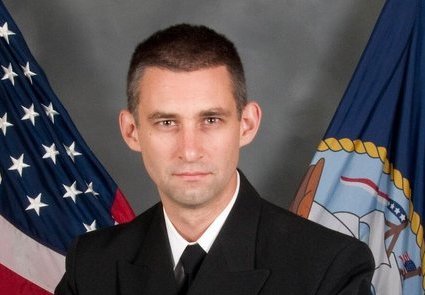Lt. Cmdr. Adam Smith – a JAG community member currently serving as deputy force judge advocate at Commander, Navy Installations Command – co-authored a chapter in the international law treatise, “Securitising Asylum Flows: Deflection, Criminalisation and Challenges for Human Rights,” which was published in May.
Smith’s chapter – which was titled, “Balancing the SAR responsibilities of States and Shipmasters” – addresses the responsibilities of states and shipmasters to render assistance at sea in the context of the Mediterranean migration crisis. Attorney Richard L. Kilpatrick, Jr. penned the chapter with him.
“My co-author and I met at Tulane University School of Law, where he studied maritime law and I focused on immigration and international development,” said Smith. “We were both deeply moved by the humanitarian crisis in the Central Mediterranean involving maritime migration, and were interested in finding some way to engage the issue as it was evolving.”
Smith earned his Juris Doctor and Master of Science in International Development from Tulane University Law School in 2012. He attended Officer Development School in August 2012 and Naval Justice School in October 2012. He previously served as the staff judge advocate for Commander, Naval Station Great Lakes and Commander, Naval Support Activity Crane, and as Legal Assistance branch head and Trial Counsel at the Rota detachment of Region Legal Service Office, Europe, Africa, Southwest Asia. Most recently, he served as deputy staff judge advocate to Commander, U.S. Naval Activities Spain, and as the primary legal advisor to four forward-deployed vessels homeported in Rota.
In 2016, Smith and Kilpatrick co-presented on search-and-rescue issues at the Queen Mary University of London’s Migration and Law Network Conference. Afterwards, they were asked to contribute to the law treatise, which was edited by leading scholars and published by Brill Nijhoff. Smith called it an honor to contribute to such a respected publication.
“Pursuing this work on top of other duties was definitely challenging, but I had a lot of great support at home and was able to get good motivation and accountability from my co-author,” said Smith. “I care very much about this subject and feel like I was able to meaningfully contribute to an ongoing dialogue about it.”
Smith also said his work on the publication was personally rewarding because it presented opportunities to travel throughout Europe and engage others who are passionate about this topic. For example, Smith established professional relationships with Spanish military officers, which positively impacted his work in Rota and resulted in invitations to several enlightening presentations on European search-and-rescue operations.
“Being able to engage with those officers in multiple capacities made my professional relationships with them deeper and allowed us to cooperate much more effectively than we would have otherwise,” said Smith.
